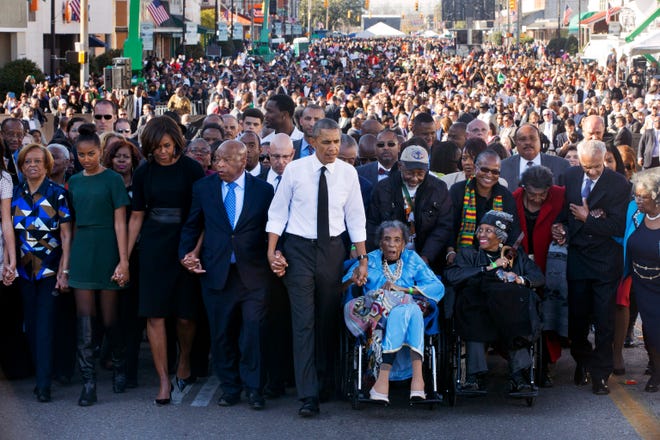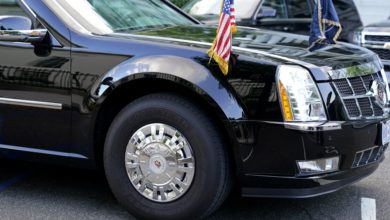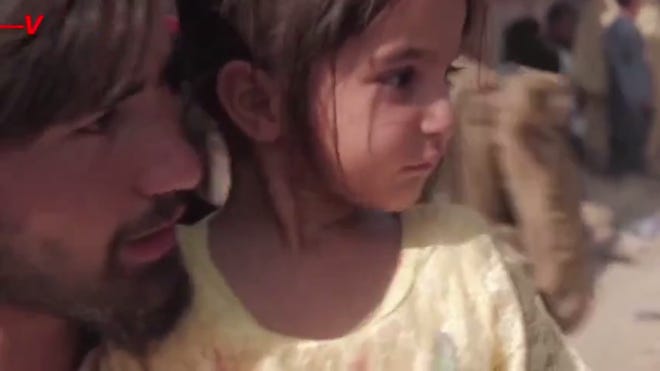
The black-and-white images that flickered across television sets from that Bloody Sunday in Selma horrified the nation.
Alabama state troopers savagely clubbing peaceful marchers as they tried to cross the Edmund Pettus Bridge. The screams of terror. The thick clouds of tear gas. The deputies on horseback, chasing frightened men, women and children back across the steel-arched structure. Beating them again and again with clubs, whips and rubber tubing wrapped in barbed wire.
"On this bridge, blood was given to help redeem the soul of America," President Joe Biden said Sunday during remarks commemorating the voting-rights demonstration.
Biden visited Selma on Sunday to mark the 58th anniversary of the march, now regarded as one of the defining moments in the nation’s civil rights movement. He delivered remarks at the Edmund Pettus Bridge and participated in the re-enactment of the bridge crossing.
"We see you are fighting to make sure no one's left behind. This is a time of choosing and we need everybody engaged," Biden said during his remarks.
In his closing remarks, he quoted activist Amelia Boynton Robinson, who walked across the bridge with 600 others on the Sunday morning of March 7, 1965.
"'You can never know where you're going, unless you know where you've been,'" Biden said. "We know where we've been. And we know more importantly, where we have to go. Forward, together."

What was Bloody Sunday?
It began as a march for voting rights for Black Americans, who faced barriers to the right to vote across much of the segregated south. Civil rights leaders planned to take their cause directly to Alabama Gov. George Wallace by marching 54 miles from Selma to the state capital of Montgomery.
Some 600 marchers, including future Georgia Congressman John Lewis, set out from the Brown Chapel AME Church on Sunday, March 7, 1965. As the demonstrators crossed the Edmund Pettus Bridge over the Alabama River, they found a line of state troops awaiting them. Behind the marchers were sheriff’s deputies and white spectators waving Confederate flags. When the peaceful protesters refused law enforcement’s orders to disperse, the officers attacked.
Television footage of the assault so enraged Americans that, just five months later, Congress passed the Voting Rights Act of 1965, a landmark law that prohibited racial discrimination in voting.

Why political leaders flock to Selma
Attendance at the anniversary crossing of the bridge has become a rite of passage for presidents and other politicians.
Barack Obama, George W. Bush and Bill Clinton have all made the pilgrimage there, each one joining modern-day civil rights activists as they traced the same path across the bridge made by those marchers nearly six decades ago. Kamala Harris, the first woman to serve as vice president, led the procession last year.
Biden’s visit on Sunday will mark the third time he has participated in the commemoration. The first vice president to take part in the annual re-enactment in 2013, he returned seven years later, this time as a presidential candidate. He delivered remarks at the city’s historic Brown Chapel AME Church just hours after strong support from Black voters in South Carolina propelled him to his first primary victory.
During both visits, Biden warned of erosions to the protections for voting rights won in the city decades ago. This year, his message is likely to hit on the same theme while also emphasizing the importance of economic justice and civil rights for black Americans.

Why voting rights are at risk
Biden promised to make voting rights a top priority for his administration. But civil-rights activists have grown frustrated as Republican-led states have moved to restrict the right to vote and bills to protect hard-won voting rights have stalled in Congress.
A coalition of faith leaders issued an open letter last month to Biden and members of Congress, putting them on notice that, should they decide to attend Sunday’s commemoration in Selma, they should come with more than empty platitudes.
They should come with a commitment to restore and expand voting rights, intensify the battle for living wages and increase economic investment in rural areas, the letter said.
“Selma is sacred ground,” the faith leaders wrote. “It is, in a very real sense, the delivery room where the possibility of a true democracy was born. It is no place to play or to be for political pretense. Either you're serious or not.”
Dig deeper
'This is not a great outcome': Supreme Court ruling brings fear of explosion in voting restrictions
Analysis:Laws aimed at voter suppression are ‘the worst’ since Jim Crow. How Black voter trends could be impacted.
What's next?Biden agenda faces uphill climb in new Congress as Republicans take over House
Contributing: The Associated Press
Michael Collins covers the White House. Follow him on Twitter @mcollinsNEWS.

Source link









